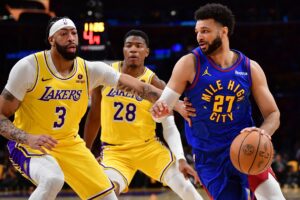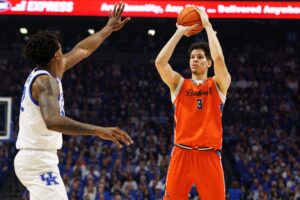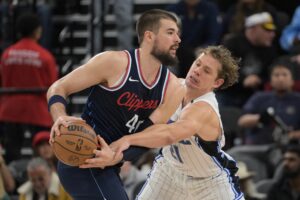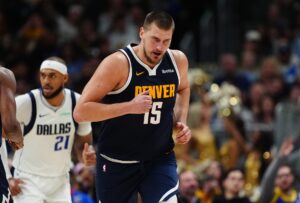The Orlando Magic had yet another poor season in 2017. Among many issues, the team was marred down by an identity problem. The back court especially had many issues. Serge Ibaka forced Aaron Gordon down to the small forward position. Nikola Vucevic and Bismack Biyombo both at center further complicated things. The team didn’t have a clear style of play to go off of with such a cluttered roster. But with a new team and front office, Orlando can take a step back in the right direction with a new identity.
Orlando Magic’s Identity in 2018
The Stars
An important part of having a team identity is having your “go-to” guys. Elfrid Payton and Aaron Gordon probably come to mind. Payton will enter the 2017-18 season coming off a strong performance after last year’s All-Star break. Aaron Gordon has seen steady progression through his career and is back to playing at the power forward position. Gordon put up respectable numbers after the all-star break as well. But are they both ready to make the leap from underwhelming youngsters to team leaders?
Aaron Gordon
Gordon averaged a much more stellar 16.4 points and 6.2 rebounds per game, shooting 50.3 percent from the floor after the All-Star break. This is a steady progression of his total career points per-game since joining the NBA. Aaron Gordon’s progression last year is spotty due to playing so much of it away from his natural position. But if he can expand on his post All-Star break play, he could be a budding star for Orlando.
Elfrid Payton
Payton also looked strong in the second half of the season. He averaged 13.5 points, 7.0 rebounds and 8.4 assists per game after the All-Star break. Payton’s game was looking much better after Ibaka was traded for Terrence Ross. Ross adds perimeter shooting that Payton doesn’t have. This takes pressure off of the point guard’s shoulders to provide outside scoring, allowing him to focus on driving inside to shoot. Payton’s passing ability is amplified by Ross’s shooting presence. But his success next season is reliant on if he can carry his level of play into next season. His jump-shot also desperately must improve. Payton’s field goal percentage was 47% and averaged 12.8 points per game for the 2016-17 season. Payton will need to improve his shooting to be the star Orlando needs.
The Bench
Orlando’s new bench is an improvement from last year, at least on paper. This summer, new general manager John Hammond brought in Jonathon Simmons, Marreese Speights and Arron Afflalo, among others. As bench players, they won’t be real game changers. They add some skill without blocking up the minutes of the teams starters. Players like Afflalo and Speights will also bring some veteran leadership to a young starting lineup. Young players coming off the bench like Mario Hezonja and Jonathan Isaac will bring energy and fill roles as they develop.
Team Identity
The biggest question entering the 2017-18 season will be what the Magic’s style will be. For now, the roster seems built to continue the athletic and defensive mold of the Hennigan era. It will be some time before the new front office can form it’s own roster. Under defense-first head coach Frank Vogel, expect the team to continue focusing on its play without the ball. With the teams best players – and rookie Jonathan Isaac – being explosive athletes with limited offensive ability, perimeter shooting and floor spacing won’t be the focal point of the Magic’s game-plan. The Magic need to emphasize on fast pace, smart defense, and transition play for their team identity.
Main Photo
Embed from Getty Images






